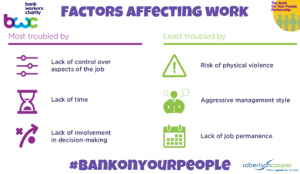THE LATEST “Bank on Your People” survey, investigating the state of employee wellbeing in the financial sector, has just been released and the findings are very interesting.
In its third successive year, it’s the only survey of its kind in the industry and it sheds new light on the factors affecting the wellbeing of bank workers.
What I find fascinating about the survey is that it represents a snapshot of wellbeing in banks, at a particular moment in time. And, because the state of employee wellbeing is never static (it’s subject to influences from events large and small in the workplace and in wider world), each survey reveals new and interesting patterns.
This time round the kinds of pressures affecting bank workers both at home and at work have altered since the last survey was conducted in 2013.
Then, in a world still profoundly affected by the financial crash, job insecurity was a significant workplace concern. Now, unsurprisingly given that we’re in the early stages of economic recovery and businesses everywhere feel more optimistic about the future, we have seen anxieties about job security recede.
In the latest survey the main sources of job related pressure are around factors associated with the nature of the work itself, such as lack of control, shortage of time, and lack of involvement in decision making. This is helpful to know as these are all issues that businesses interested in employee wellbeing, have the capacity to address.

However, among many valuable insights arising from the study, what interests me most is that the latest report reinforces a key finding from previous surveys. This is that non-work pressures, the problems and challenges that employee’s face in their personal lives, (things like relationship breakdown, debt and bereavement), have a significant and negative impact on employee wellbeing.
And there are consequences that flow from that. The links between wellbeing and key organisational indicators such as performance, productivity and engagement are now well recognised, so the reduction in levels of wellbeing when these problems persist, will impact negatively on organisational performance.
Also changed this time are the non-work pressures affecting bank workers, with financial concerns of one kind or another predominating. Once more this makes sense, as during the period covered by the survey, incomes had still not recovered to 2007 levels. With wage growth negligible in the face of soaring food and fuel prices, Many family budgets have been under unprecedented strain.
To me this confirms what most of us know intuitively, that when people are struggling with significant difficulties outside work, whether it’s in their personal relationships, over a bereavement, or in their finances, then the impact of those pressures will not be restricted to the home. Almost inevitably they’re going to spill over into the workplace, frequently in the form of sickness absence and poor performance.

This holds a clear message for banks seeking to address wellbeing at work. To make a difference they need to ensure that they don’t focus exclusively on what is happening in the workplace. Only by taking a whole person approach, one that gives equal primacy to non- work issues, will they get the full benefits from their wellbeing strategies.
To download the Bank On Your People report, please click here.
Paul Barrett is the Head of Wellbeing at the Bank Workers Charity. He has worked in the workplace wellbeing field for over 20 years. His special areas of interest include employee engagement and organisational culture change.

